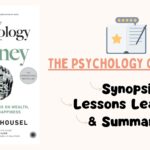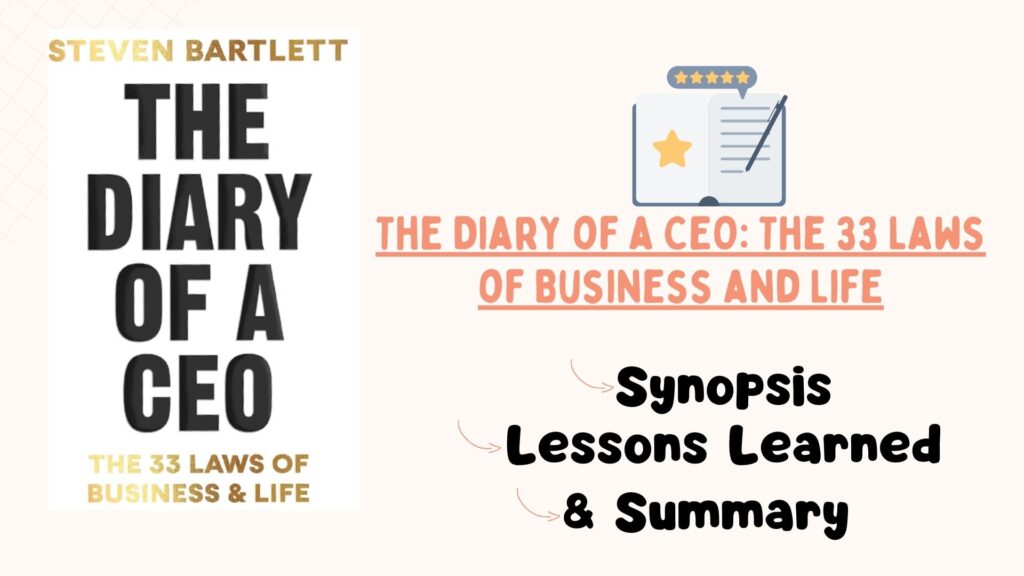Enrich your knowledge and expertise with the invaluable insights garnered from Steven Bartlett’s acclaimed book, The Diary of a CEO – The 33 Laws of Business and Life. In this guide, we delve into the profound lessons that can be gleaned from Bartlett’s experiences and wisdom, highlighting the essential principles that can transform the way you approach business and life. Discover the crucial keys to success, potential pitfalls to avoid, and the fundamental aspects of personal growth and development that can pave the way to a fulfilling and impactful existence.
Key Takeaways:
- Emotional Intelligence is crucial: Bartlett stresses the importance of emotional intelligence in business and life. He believes that understanding and managing emotions is key to success.
- Focus on creating value: The author emphasizes the need to focus on creating value for others rather than solely focusing on making money. He asserts that creating value will ultimately lead to financial success.
- Importance of self-awareness: Bartlett discusses the significance of self-awareness in understanding one’s strengths and weaknesses, which is essential for personal and professional growth.
- Resilience is key: The book highlights the importance of resilience in overcoming challenges and setbacks. Bartlett shares his own experiences of failure and how resilience helped him bounce back.
- Authenticity in leadership: Bartlett advocates for authenticity in leadership, emphasizing the importance of being true to oneself and leading with honesty and transparency.
- Continuous learning and growth: The author emphasizes the need for continuous learning and personal growth, highlighting the value of acquiring new skills and knowledge throughout life.
- Building a strong support network: Bartlett stresses the importance of surrounding oneself with a strong support network of mentors, advisors, and friends who can offer guidance and support.
Understanding the Types of Laws in Business and Life
Obviously, in business and life, there are laws that govern how things work and how we should navigate through them. In his book, ‘The Diary of a CEO – The 33 Laws of Business and Life’, Steven Bartlett outlines these laws to help us understand and implement them effectively.
Importantly, the information should be broken down into a table with 2 columns and 5 rows, illustrating the various types of laws and their impact on our personal and professional growth.
| Personal Development Laws | Business Growth Laws |
| Relationship Management Laws | Financial Wisdom Laws |
Personal Development Laws
Types of laws that focus on individual growth and improvement fall under the category of personal development. These laws guide us on how to cultivate a positive mindset, build resilience, and enhance our emotional intelligence to thrive in both personal and professional settings.
Business Growth Laws
Laws related to business growth encompass strategies and principles that contribute to the expansion and success of a company. These laws dictate how to innovate, adapt to market changes, and scale a business effectively to achieve sustainable growth and profitability.
The laws related to business growth are crucial for entrepreneurs and business leaders aiming to build and sustain a successful enterprise amid intense competition and market dynamics.
Relationship Management Laws
With relationship management laws, individuals are guided on how to foster meaningful connections, communicate effectively, and resolve conflicts in personal and professional relationships. These laws emphasize the importance of empathy, active listening, and building trust to nurture fruitful relationships.
Plus, mastering the relationship management laws can lead to enhanced collaboration, team cohesion, and mutual understanding within any social or professional setting.
Financial Wisdom Laws
Development of laws related to financial wisdom covers the principles and practices for managing wealth, making sound investment decisions, and achieving financial stability and prosperity. These laws offer valuable insights into budgeting, saving, and growing one’s financial resources.
Laws concerning financial wisdom are crucial for individuals and businesses to mitigate risks, maximize opportunities, and build a secure financial foundation for the future.
Tips for Implementing the Laws into Your Life
To truly implement the 33 laws of business and life from “The Diary of a CEO” by Steven Bartlett into your life, you must start by embracing a growth mindset. Growing is NOT GOING TO BE EASY! This involves adopting the belief that your abilities and intelligence can be developed through dedication and hard work. Additionally, effective time management strategies are crucial for maximizing productivity and achieving your goals. Finally, enhancing communication skills and practicing financial planning and management are essential for success in both business and life.
Developing a Growth Mindset
Tips for developing a growth mindset include embracing challenges, persisting in the face of setbacks, and seeing effort as the path to mastery. Instead of viewing failure as a permanent condition, see it as an opportunity to learn and grow. Through this mindset, you can cultivate a hunger for learning and a resilience that is essential for navigating the challenges of business and life.
Effective Time Management Strategies
Mindset is crucial when it comes to effective time management. Start by prioritizing tasks based on their importance and urgency, and avoid multitasking, which can lead to decreased productivity. Remember that time is a valuable resource that should be used wisely to achieve your business and life goals.
Strategies like setting specific goals, using tools and technology to streamline tasks, and breaking tasks into smaller, manageable chunks can help you make the most of your time and accomplish more in your business and personal life.
Enhancing Communication Skills
The ability to effectively communicate is crucial in both personal and professional relationships. Whether it’s through verbal or written communication, mastering the art of conveying your thoughts and ideas clearly and persuasively can positively impact your business and social interactions.
Plus, focusing on active listening and empathy can lead to stronger relationships, better collaboration, and more effective leadership in business settings.
Financial Planning and Management
Communication is also key when it comes to financial planning and management. Whether it’s communicating your financial goals to a financial advisor or communicating budget constraints to your team, being open and clear about financial matters is crucial for success.
A solid understanding of financial concepts, such as budgeting, investing, and managing debt, is essential for business owners and individuals alike. This knowledge empowers you to make informed financial decisions that can set you up for long-term success.
Step-by-Step Guide to Applying the 33 Laws
Not only does Steven Bartlett’s ‘The Diary of a CEO – The 33 Laws of Business and Life’ provide valuable insights and wisdom, but it also offers a clear guide to apply the 33 laws to your personal and professional life. Below is a step-by-step breakdown of how you can effectively implement these laws into your daily routine.
| Self-Assessment and Goal Setting | Understanding your strengths and weaknesses, setting specific, measurable goals |
| Creating a Personalized Action Plan | Developing a detailed plan, breaking down goals into smaller tasks |
| Monitoring Progress and Adapting Strategies | Tracking your advancement, adjusting plans based on results |
| Incorporating Feedback and Continuous Improvement | Seeking input from others, constantly improving based on feedback |
Self-Assessment and Goal Setting
An essential first step in applying the 33 laws is to conduct an honest self-assessment and set clear, achievable goals. Assessing your strengths and weaknesses allows you to identify areas for improvement, while setting concrete goals provides a clear direction for your actions.
Creating a Personalized Action Plan
One of the keys to successfully applying the 33 laws is creating a personalized action plan. Breaking down your goals into smaller, manageable tasks not only ensures progress but also provides clarity on the steps needed to achieve success. For instance, if your goal is to enhance your public speaking skills, your action plan may include tasks such as joining a local Toastmasters club or practicing in front of a mirror daily.
Monitoring Progress and Adapting Strategies
Setting up a system to monitor your progress and regularly evaluating your strategies is crucial in the application of the 33 laws. Monitoring allows you to track your advancement towards your goals, while adapting strategies based on results ensures that you stay on the right track towards success.
Incorporating Feedback and Continuous Improvement
An integral part of applying the 33 laws is incorporating feedback from others and continuously seeking ways to improve. Seeking input from mentors, colleagues, and even clients provides valuable insights and different perspectives that can help you grow both personally and professionally. StepbyStep, as you receive feedback, you can implement necessary changes and refine your approach, ultimately leading to continuous improvement.
Analyzing the Impact of the Laws
Now that we have delved into Steven Bartlett’s “The Diary of a CEO – The 33 Laws of Business and Life,” it’s time to analyze the impact of the laws discussed in the book. As we reflect on the lessons learned, it’s important to consider the factors that contribute to both success and failure when applying these laws in real-life scenarios.
Factors Contributing to Success and Failure
On the journey to implementing the laws laid out by Steven Bartlett, it’s crucial to understand the factors that can determine success or failure. Here are some key contributors to both outcomes:
- Adaptability: The ability to adapt to changing circumstances.
- Resilience: The capacity to recover quickly from difficulties.
- Perseverance: The determination to continue moving forward despite obstacles.
This understanding can significantly impact the way the laws are applied in various situations and ultimately influence the results they yield.
Pros and Cons of Strictly Following the Laws
| Factors | Impacts |
| Pros | May lead to disciplined and consistent actions. |
| Cons | Could limit flexibility and creativity in problem-solving. |
Consistently following the laws can provide structure and discipline, but it’s important to recognize the potential drawbacks of rigid adherence.
Case Studies: Success Stories and Lessons Learned
On the journey to understanding the impact of the laws, it’s valuable to explore real-life case studies and the insights gained from them. Here are some examples:
- Case Study 1: Company A increased its revenue by 50% after implementing Law 16 – The Law of Persistence.
- Case Study 2: Entrepreneur B faced multiple setbacks but demonstrated remarkable resilience, eventually achieving success through Law 9 – The Law of Adaptability.
It is through these case studies that we gain a deeper understanding of how the laws can be applied in diverse contexts and the outcomes they can yield.
The Role of Persistence and Resilience
Analyzing the impact of the laws also underscores the significance of persistence and resilience in achieving success. These two traits play a pivotal role in the effective application of the laws and navigating the challenges that come with them.
Lessons learned from the amalgamation of the laws, their application, and the outcomes can provide invaluable insights for individuals striving to make an impact in the realms of business and life.
Summing up
With these considerations from “The Diary of a CEO” by Steven Bartlett, readers are given a valuable insight into the 33 laws of business and life. The book emphasizes the importance of self-awareness, resilience, and continual growth, providing practical wisdom that can be applied to both professional and personal endeavors. Bartlett’s candid reflections and actionable advice make this book a must-read for aspiring entrepreneurs, leaders, and anyone seeking to navigate the complexities of modern life with purpose and intention.
FAQ
Q: What is the book “The Diary of a CEO – The 33 Laws of Business and Life” about?
A: “The Diary of a CEO – The 33 Laws of Business and Life” is a book written by Steven Bartlett, in which he shares personal experiences and insights on business and life lessons he has learned throughout his journey as a CEO. The book offers practical advice and actionable strategies for personal and professional growth.
Q: What are some key lessons learned from the book?
A: Some key lessons learned from the book include the importance of self-awareness, the power of resilience in the face of adversity, the value of building meaningful relationships, the significance of continuous learning and self-improvement, and the impact of authenticity and vulnerability in leadership.
Q: How can the lessons from the book be applied in business and life?
A: The lessons from the book can be applied in business and life by fostering a growth mindset, setting clear goals and priorities, cultivating emotional intelligence and empathy, honing communication skills, embracing failure as a learning opportunity, and consistently seeking personal and professional development.
Q: What makes “The Diary of a CEO – The 33 Laws of Business and Life” a valuable read?
A: “The Diary of a CEO – The 33 Laws of Business and Life” stands out as a valuable read due to its raw and authentic approach to sharing personal experiences, practical wisdom, and actionable insights. The book provides a unique blend of business philosophy, self-help, and memoir, making it relatable and impactful for a wide range of readers.
Q: How can individuals benefit from applying the 33 laws described in the book?
A: By applying the 33 laws described in the book, individuals can benefit by gaining a deeper understanding of themselves, refining their decision-making skills, building resilience, fostering meaningful connections, achieving greater clarity in their personal and professional pursuits, and ultimately, experiencing growth and fulfillment in both business and life.









